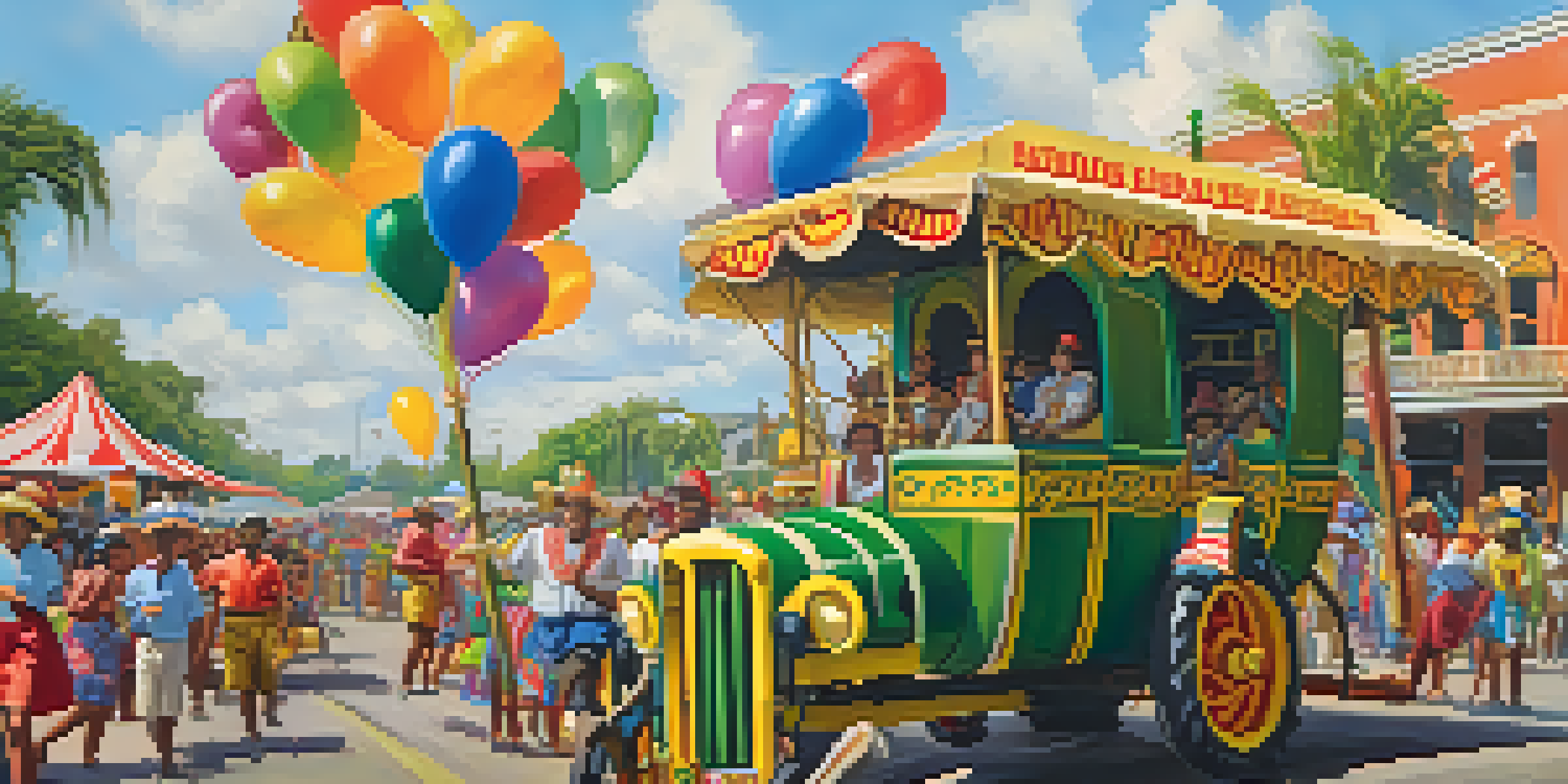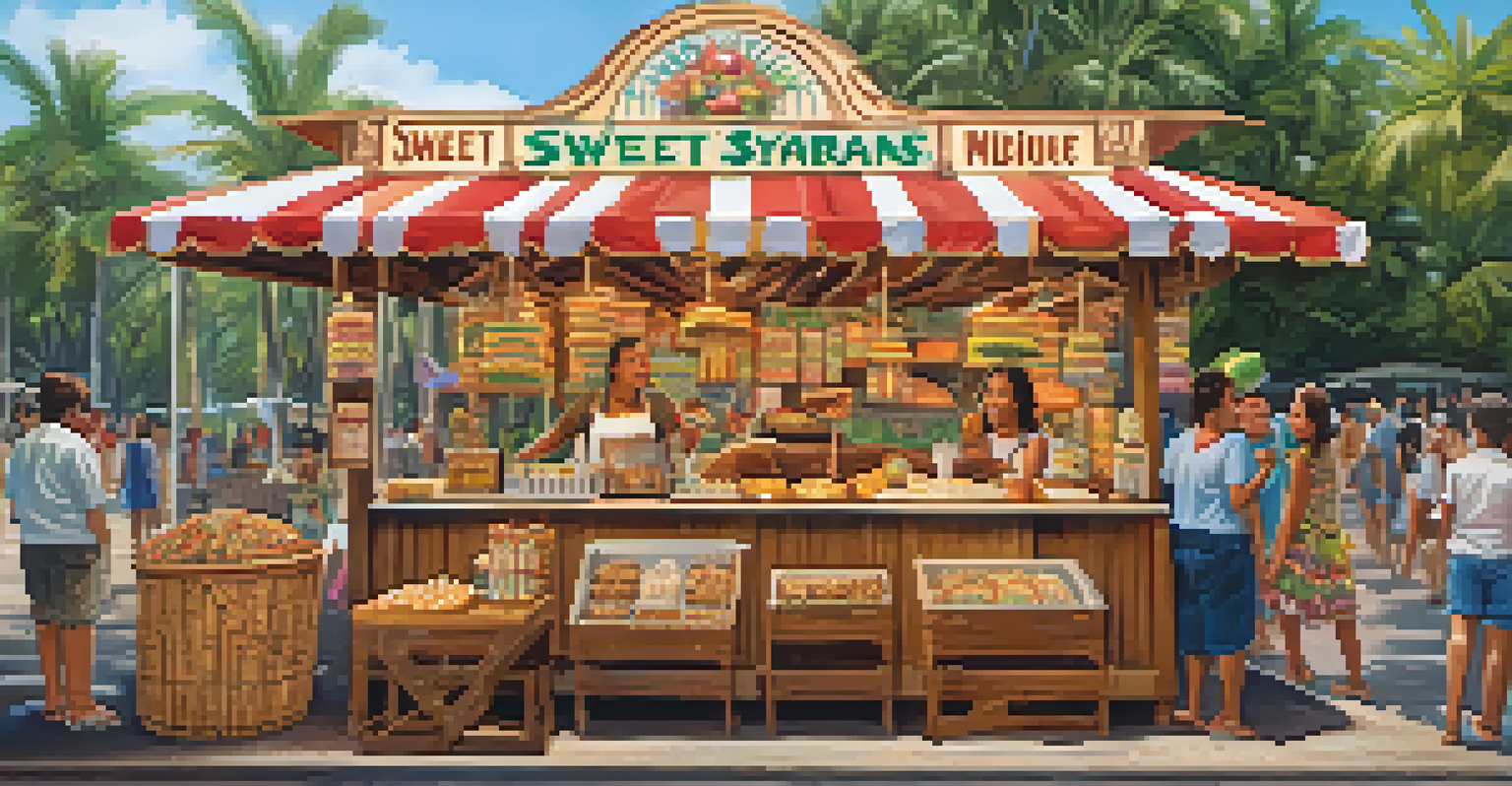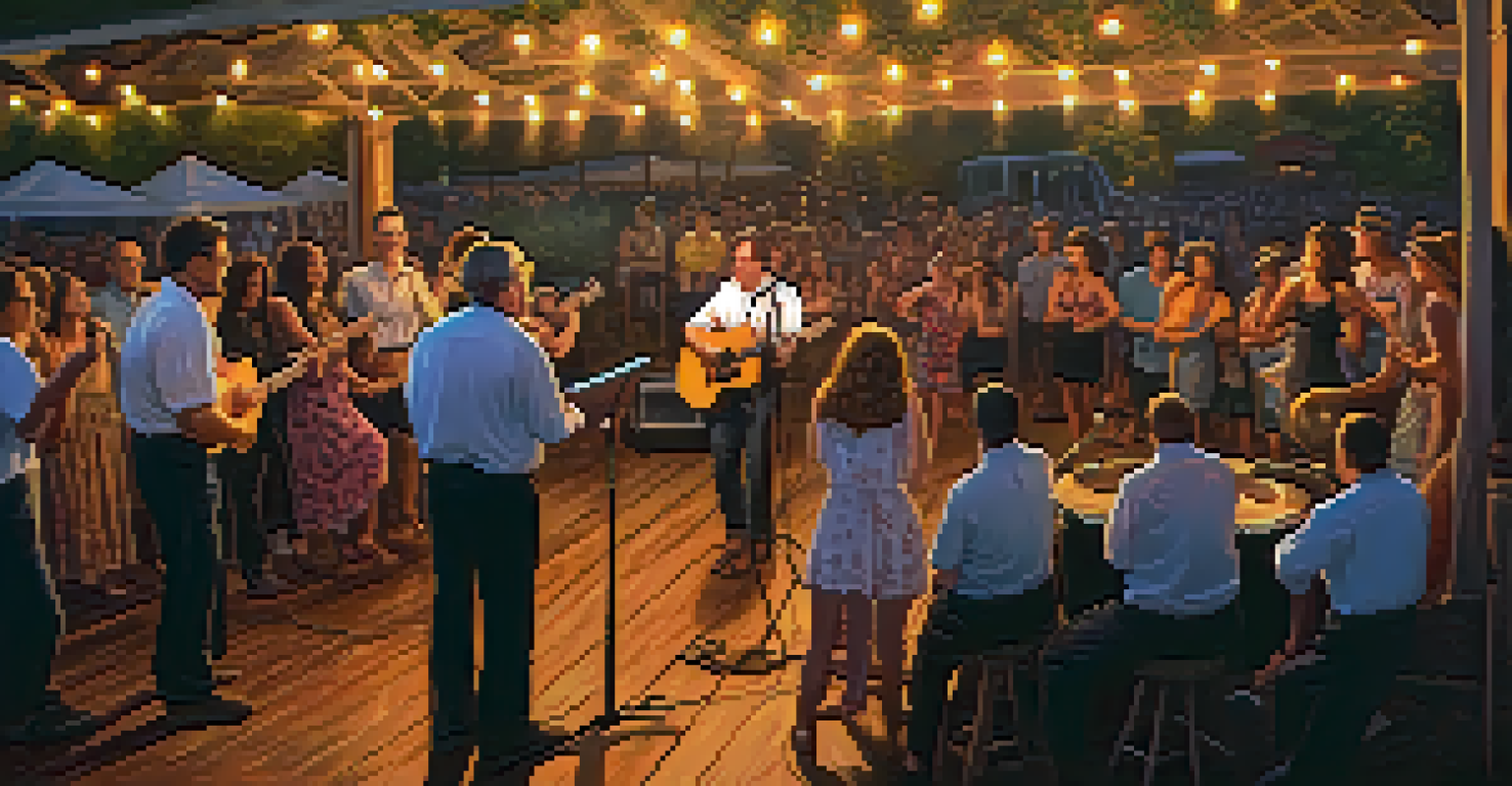The Unique Heritage of the Louisiana Sugar Cane Festival

A Celebration of Sugar Cane: Festival Origins
The Louisiana Sugar Cane Festival, held annually in New Iberia, celebrates the region's rich history in sugar production. This festival traces its roots back to the early 20th century, when local sugar cane farmers sought to showcase their harvest. Over the years, it has evolved into a vibrant event that honors not just the sugar industry but the culture and community surrounding it.
The culture of Louisiana is rich and diverse, and the Sugar Cane Festival is a vibrant celebration of that culture, uniting people through music, food, and tradition.
Each year, the festival attracts thousands of visitors who come to enjoy a variety of activities, from parades to live music. These festivities provide an opportunity for locals and tourists alike to immerse themselves in the unique charm of Louisiana's Cajun and Creole heritage. The festival serves as a reminder of the hard work and dedication of sugar cane farmers throughout history.
As you wander through the festival, you'll find booths showcasing local crafts, delicious food, and, of course, sugar cane-based treats. This blend of history and culture creates a festive atmosphere that keeps attendees returning year after year, eager to celebrate this vital aspect of Louisiana's agricultural landscape.
Cultural Significance: More Than Just Sugar
While the focus of the festival is on sugar cane, its cultural significance runs much deeper. The event embodies the spirit of the community, uniting people from various backgrounds to celebrate a shared heritage. Through music, dance, and culinary traditions, the festival showcases the diverse influences that have shaped Louisiana's culture over the centuries.

One example is the incorporation of Cajun and Creole music, which fills the air during the festival. Artists from the region perform traditional songs that echo the sounds of the past, connecting generations through their rhythms. This musical heritage is not only entertaining but also educates attendees about the area's rich cultural tapestry.
Celebrating Sugar Cane Heritage
The Louisiana Sugar Cane Festival honors the region's rich history in sugar production while showcasing its vibrant culture and community.
Food also plays a crucial role in the festival's cultural identity. Local chefs whip up traditional dishes using sugar cane, creating culinary experiences that reflect the flavors of Louisiana. From sweet cane syrup to savory gumbo, the food highlights the unique blend of influences that define the region's cuisine, making it a true feast for the senses.
Festivities: Events and Activities at the Festival
The Louisiana Sugar Cane Festival is packed with events and activities that cater to all ages. From the lively parades that kick off the festivities to the thrilling sugar cane cooking contest, there’s something for everyone to enjoy. Families can participate in arts and crafts, games, and educational exhibits, making it a perfect outing for kids and adults alike.
Sugar is a universal currency, and we need to preserve the traditions that keep it flowing from the fields to our tables.
One of the festival's highlights is the crowning of the Sugar Cane Queen, a tradition that adds a touch of glamour to the celebration. This pageant not only recognizes young women in the community but also empowers them to represent their heritage proudly. The queen and her court often take part in various events throughout the festival, symbolizing the connection between tradition and modernity.
As the sun sets, the festival comes alive with energetic performances from local bands and dance troupes. Attendees are encouraged to join in the festivities, dancing the night away under the stars. This sense of community and shared joy creates lasting memories, making the festival a cherished annual tradition.
Sugar Cane Farming: The Backbone of the Festival
At the heart of the Louisiana Sugar Cane Festival is the sugar cane farming industry, which has been a cornerstone of the local economy for generations. This agricultural practice not only provides livelihoods for many families but also shapes the landscape and culture of the region. The festival serves as a platform to educate attendees about the importance of sugar cane farming and its impact on the community.
Visitors can learn about the sugar cane growing process, from planting to harvesting, through interactive exhibits. These displays often feature equipment used in modern farming, showcasing how technology has transformed the industry. By highlighting the hard work that goes into sugar production, the festival fosters appreciation for the farmers who dedicate their lives to this craft.
Cultural Unity Through Festivities
The festival brings together diverse backgrounds, highlighting Louisiana's unique Cajun and Creole influences through music, food, and traditions.
Additionally, the festival emphasizes sustainable farming practices, encouraging future generations to consider careers in agriculture. Workshops and discussions led by local farmers promote awareness of environmental issues and the importance of preserving the land. This commitment to sustainability is vital for both the industry and the community, ensuring that the festival can continue for years to come.
Traditions and Customs: Keeping Heritage Alive
The Louisiana Sugar Cane Festival is steeped in traditions that have been passed down through generations. These customs not only preserve the history of sugar cane farming but also strengthen community bonds. From the opening ceremony to the closing dance, each event is infused with cultural significance and a sense of belonging.
One beloved tradition is the blessing of the sugar cane fields, a ritual that honors the land and the farmers who work it. This moment of reflection allows participants to express gratitude for the blessings of the harvest. It serves as a poignant reminder of the deep connection between the community and the land, reinforcing the values of respect and stewardship.
As time goes on, the festival continues to adapt while staying true to its roots. New customs, such as incorporating modern music and art, attract younger generations, ensuring that the festival remains relevant. This blend of old and new creates a dynamic atmosphere that celebrates both heritage and innovation, making the festival a true reflection of Louisiana's evolving culture.
Community Involvement: The Heart of the Festival
The success of the Louisiana Sugar Cane Festival is largely due to the dedication of the local community. Volunteers play a crucial role, working tirelessly to organize events, set up booths, and ensure everything runs smoothly. This spirit of collaboration fosters a sense of ownership and pride among residents, making the festival a true community effort.
Local businesses also contribute significantly, sponsoring events and providing resources to enhance the festival experience. Their support not only showcases the strength of the local economy but also emphasizes the importance of community partnerships. This collaborative approach helps create a welcoming atmosphere that encourages visitors to explore and engage with the festival.
Community Effort and Involvement
Local volunteers and businesses play a crucial role in organizing the festival, fostering a strong sense of community pride and collaboration.
The festival also serves as a platform for local artists and entrepreneurs, allowing them to showcase their talents and products. From handmade crafts to delicious food, the event promotes local culture and creativity. This emphasis on community involvement not only enriches the festival but also strengthens the bonds that tie residents together.
Future of the Festival: Preserving the Legacy
As the Louisiana Sugar Cane Festival continues to grow, its future is bright, filled with opportunities to preserve and celebrate its unique heritage. Organizers are dedicated to ensuring that the festival remains a vibrant reflection of the community's values and history. This commitment to preservation allows future generations to experience the rich cultural tapestry that defines Louisiana.
One way the festival is evolving is by incorporating education into its programming. Workshops on sugar cane farming, cooking demonstrations, and discussions on sustainability are becoming integral parts of the festival. These initiatives not only honor the past but also prepare attendees for the future, fostering a greater understanding of the agricultural industry.

Moreover, the festival aims to expand its reach by engaging with younger audiences through social media and interactive online content. By embracing technology, the festival can connect with a broader audience, ensuring that its traditions and customs continue to thrive in an ever-changing world. The Louisiana Sugar Cane Festival is not just a celebration; it's a living legacy.